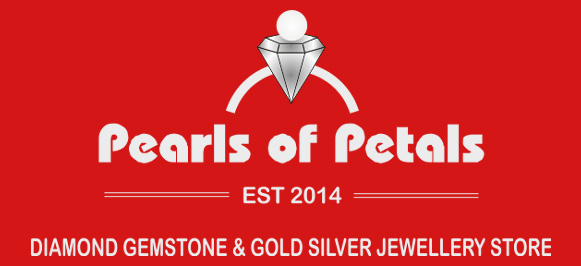Pearls of Petals HPHT Lab Grown Polished Diamond, Synthetic Diamonds & HPHT Polished Diamonds and all Type Gemstone and Gold Silver Jewellery Store..

DIAMOND GUIDE: DIAMOND TYPES, CUTS AND QUALITY COLOR

The ideal diamond is completely colorless. These are the most expensive types of diamond. Though most diamonds appear colorless, they actually have slight tones of yellow or brown. The Gemological Institute of America (GIA), the authority in diamond certification, grades color alphabetically from D (totally colorless) to Z (heavily tinted).
The difference in grades is very subtle, and mostly not visible to the naked eye. A diamond with a visible tint such as K and above can still be beautiful if it has a good clarity and cut. Only diamonds graded N onwards have a tint that is visible to the naked eye. Beyond S the tint grows more intense. Natural colored diamonds come in all shades and colors of the rainbow. The most popular colors and diamond types are a combination of pink, blue, brown, yellow, orange, green and red. Yellow is the most common naturally occurring color in a diamond.
White, red, blue and green diamonds are very rare diamond types.
CUT
The cut refers to the proportions, finish, symmetry and polish of the diamonds. These factors determine the intensity and brilliance of a diamond. A well-cut diamond is proportioned, symmetrical, and polished; these are typically the most expensive types of diamond. Well-cut diamonds sell at a premium and poorly cut diamonds sell at discounted prices.
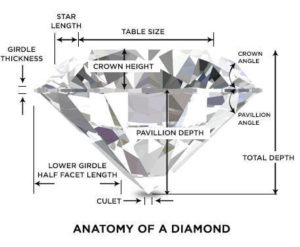
The width and depth of the cut can have an effect on how light travels within the diamond and how it exits in the form of brilliance.
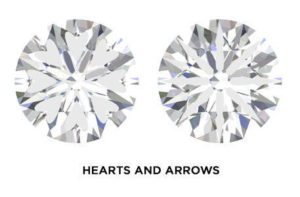
Too much shadow and light is lost from the bottom, causing the diamond to lose brilliance. Too deep a cut allows light to escape from the sides causing the diamond to appear dark and dull.
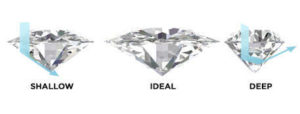
The term “cut” can also refer to the style of the diamond cut, for instance, certain diamond types are known as “princess cut diamonds,” “round cut diamonds,” or “heart cut diamonds.”
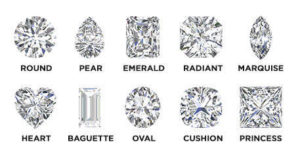
CLARITY

The clarity of a diamond is gauged using the differentiators below. With clarity, the types of diamond are gauged depending on the quantity and visibility of flaws.
FL – Completely Flawless.
IF (Internally Flawless) – The external flaws can be removed by further polishing.
VVS1 – VVS2 (Very Very Slightly Included) – Only an expert can detect flaws with a 10X microscope. By definition, if an expert can see a flaw from the top of the diamond, it is a VVS2. If the expert can only detect flaws while viewing the bottom of the stone, then it is a VVS1.
VVS1 clarity diamonds do not have any internal black marks. Then they also fall in the “No Dosham” or “No Black” category.
VS1 – VS2 (Very Slightly Included) – Flaws are visible with a 10X microscope, but it is not obvious (takes more than 10 seconds to identify the flaws).
SI1 – SI2 (Slightly Included) – Flaws are readily visible with a 10X microscope.
I1 – I3 (Included) – Flaws are eminently visible and can be found with the naked eye.
CARAT
Size is the most visible factor that determines the value of all diamond types. The price of the diamond rises exponentially depending on its size.
By definition, 1 carat is 200 milligram. Since most diamonds sold in the market weigh less than 1 carat, the carat is usually subdivided into “points”. There are 100 points in a single carat. So, a diamond weighing 3/4 carat would be a “75 point diamond”.
1 carat = 200 milligrams = 100 points.
Carat weight is not a factor that denotes diamond quality. While some of the other quality metrics have more bearing in the quality of specific types of diamonds, carat merely denotes the size of a diamond, by its weight. Diamonds of 0.50 – 0.75 carat are very popular for their size and value. Large diamonds are rarer to find in mines than small ones and thus large diamond types are much more valuable.

